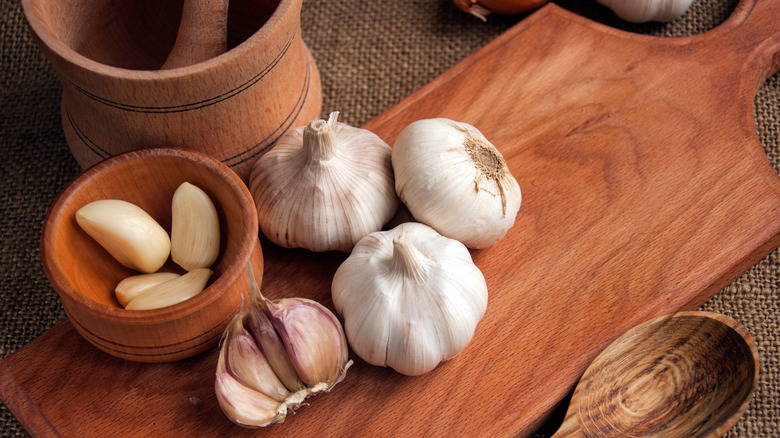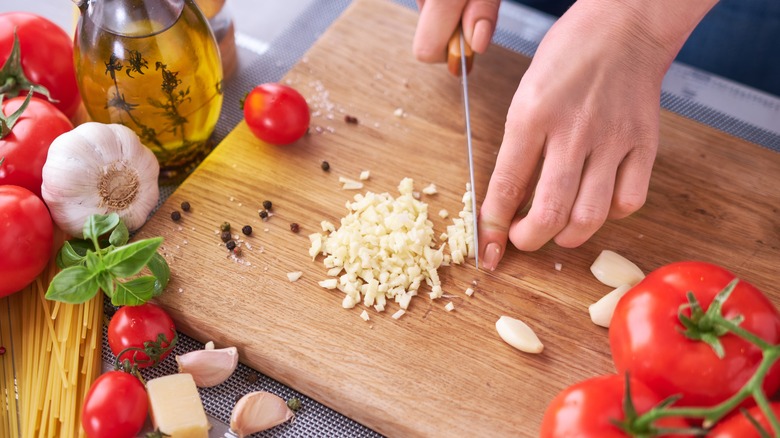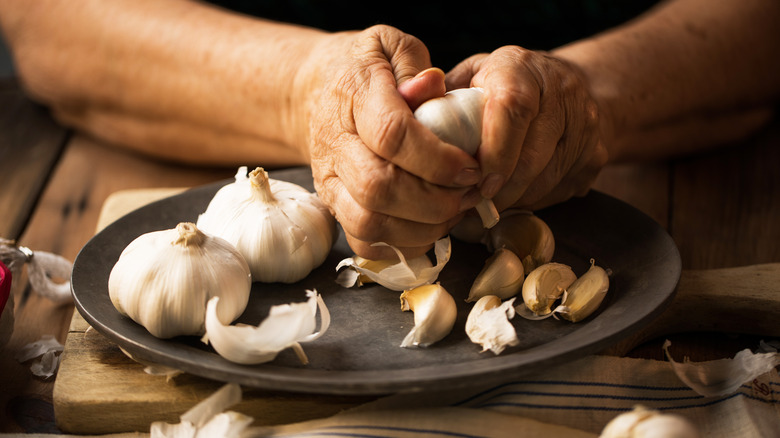The Science Behind Why Garlic Is So Sticky
Garlic is one of those flavor enhancers that can end up in nearly any savory dish. If you cook, you probably cook with garlic. And, you probably get bits of chopped garlic stuck to your fingers or your knife. It's annoying. Why does that even happen, anyway?
The short answer is sulfur. Garlic contains lots of sulfur — a bulb of it contains around 33 different compounds that include sulfur. The main one is called allicin, a type of organosulfur compound. Allicin is the substance that gives garlic both its strong smell and its sticky texture. Allicin is likely a self-defense mechanism for fending off predators like bugs, rodents, or us. But, we eat it anyway despite the bad smells and stickiness meant to ward us off because it's delicious.
On top of that, garlic contains natural sugars, and sugar always gets sticky when it's heated up — sticky caramel is just burnt sugar, for example. There are even more small compounds in garlic that can become sticky, especially when they come into contact with your skin while you're chopping it up.
Dealing with sticky garlic
So, if garlic's stickiness can all be chalked up to simple chemistry, you might be wondering if there's anything in your kitchen that makes garlic less sticky. Yes, there is, if you've got olive oil or salt lying around. Olive oil and garlic go well together, and a small amount of it goes a long way in stopping garlic bits from sticking to your knife or your fingers. Just splash some on the cloves before you begin chopping or coat your knife with olive oil.
Alternatively, a pinch of salt should have the same effect. Salt interferes with these chemical reactions while drying out the garlic cloves. Whether you go with olive oil or salt depends on your own cooking preferences or the dish in question. You might choose olive oil if you're chopping garlic for a pasta dish, or you might go with salt if you're cooking up garlic chicken breast. Luckily, both of these garlic un-stickers are extremely common ingredients you probably cook with anyway.
It's good to be sticky
Garlic is a superfood: despite sulfur's bad smell and sticky texture, the allicin and other sulfuric compounds inside garlic are actually extremely good for you. Sulfur is good for helping your body repair damaged cells (which can help protect against cancer), and it's also good for your skin health. Other studies suggest that it's good for heart health and cholesterol. Although, garlic is most healthy when it's raw rather than cooked, so the stickiness from that allicin is just the price to pay for all the benefits it brings. Unless you use the above tips, of course.
Garlic is a member of the Allium plant family, which also includes onions, leeks, shallots, and scallions, and they all have similar health benefits. In fact, the same sulfuric compounds in garlic are found in onions, but instead of making them sticky when you chop them, the sulfur makes your eyes water instead. However, even though onions contain allicin, if your onions become sticky it could mean they're getting old — unlike garlic, where stickiness is a natural part of the chopping process.


